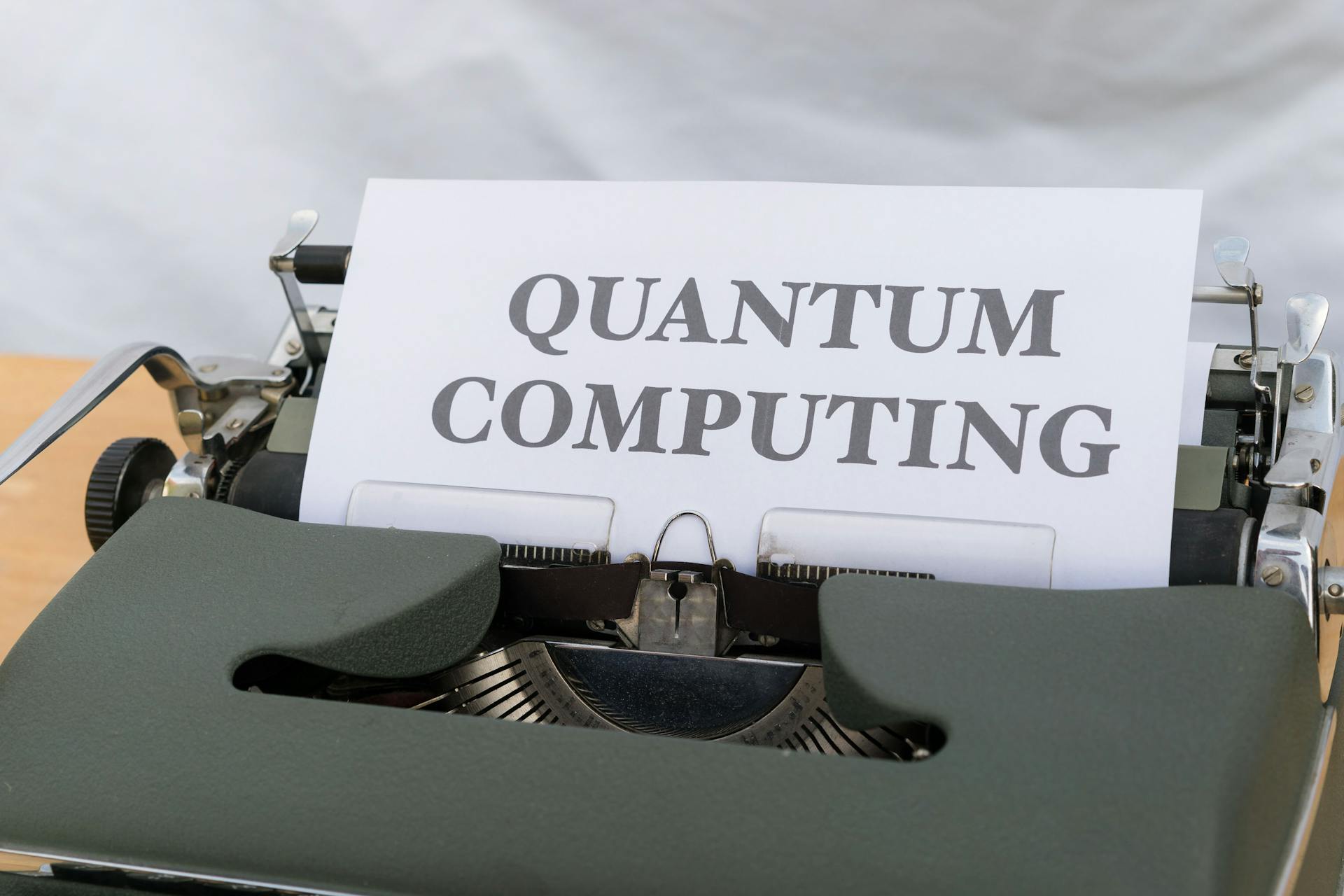
Quantum machine learning has the potential to solve complex problems in fields like image recognition and natural language processing. It can also help in areas like disease diagnosis and personalized medicine.
These applications are made possible by the ability of quantum computers to process vast amounts of data exponentially faster than classical computers. This is due to the principles of superposition and entanglement that allow quantum computers to explore an exponentially large solution space simultaneously.
Quantum machine learning algorithms like Quantum Support Vector Machines (QSVMs) and Quantum k-Means can be used to improve the accuracy of predictions and classifications. QSVMs, for example, can be used to classify images with high accuracy and speed.
The potential benefits of quantum machine learning are vast, and it's an exciting area of research that holds much promise for the future.
For another approach, see: A Practical Guide to Quantum Machine Learning and Quantum Optimization
Quantum Machine Learning Basics
Quantum machine learning is a process that integrates classical machine learning with quantum computing. This means that quantum computing is used to apply machine learning concepts and techniques instead of relying solely on classical computing and programs.
Expand your knowledge: Quantum Machine Learning Companies
Classical computers use bits that can only be in one of two states: 0 or 1. Quantum computers, on the other hand, use qubits that can be in multiple states simultaneously due to the principle of superposition.
The principle of superposition can be illustrated with a coin toss. Before the coin lands, it can't be said to be in a heads or tails state, but rather it exists in a state of both heads and tails simultaneously.
Quantum machine learning has the potential to revolutionize various fields, including AI, by leveraging the power of quantum computing. Companies like D-Wave, Google, and IBM are already working on quantum processors and quantum AI labs.
Here's a list of some of the key players in the quantum machine learning space:
- D-Wave - Owner of a quantum processor
- Google - Quantum AI Lab
- IBM - Quantum Computer Lab
Quantum machine learning is a rapidly evolving field, with new breakthroughs and advancements being made regularly. For example, in 2019, Google achieved quantum supremacy, demonstrating the power of quantum computing over classical computing.
Quantum Algorithms
Quantum algorithms are a game-changer in machine learning, allowing us to make algorithms' training on enormous datasets faster and more efficient. This is especially true for QML algorithms, which can be super faster compared to classical machine learning.
One of the main benefits of quantum algorithms is their ability to solve certain optimization problems more efficiently than classical algorithms. This is particularly useful for tasks like finding the global minimum of a complex function.
Quantum algorithms can also improve pattern recognition by exploiting quantum mechanical phenomena like superposition and entanglement. This allows quantum systems to identify patterns in data more accurately and efficiently.
Here are some examples of the quantum advantage in machine learning:
- Enhanced Optimization: Quantum algorithms can solve certain optimization problems more efficiently than classical algorithms.
- Improved Pattern Recognition: Quantum systems can identify patterns in data more accurately and efficiently.
- Enhanced Simulation and Modeling: Quantum computers can simulate complex quantum systems.
- Faster Data Processing: Quantum algorithms may provide appreciable speedups for some data processing and machine learning model training applications.
Neural Networks
Quantum neural networks can leverage quantum phenomena like superposition and entanglement to enable qubits to simultaneously exist in multiple states and exhibit correlation with each other.
These networks can perform faster and more efficient learning than classical neural networks. Quantum neural networks are neural networks that operate on quantum logic gates and qubits, the basic units of quantum information.
For your interest: Hidden Layers in Neural Networks Code Examples Tensorflow
Quantum neural networks can achieve a significantly better effective dimension than comparable classical neural networks. This means they can learn and represent complex patterns in data more accurately.
The power of quantum neural networks lies in their ability to exploit quantum mechanical phenomena to identify patterns in data more accurately and efficiently. This is particularly useful in applications like image recognition and processing.
Quantum neural networks can be used to develop more advanced and accurate image segmentation and processing applications. They can also be used to improve pattern recognition and classification tasks.
Here are some key benefits of quantum neural networks:
- Faster and more efficient learning
- Significantly better effective dimension
- Ability to exploit quantum mechanical phenomena
- Improved pattern recognition and classification
- More accurate image segmentation and processing
Supervised Models Are Kernel Methods
Supervised models are essentially kernel methods. This means they can be thought of as a type of machine learning model that uses a kernel function to map input data into a higher-dimensional space.
Near-term quantum devices are available, and researchers are racing to develop fault-tolerant quantum computers. This has led to an interest in replacing traditional machine learning models with quantum circuits.
Quantum circuits can be used to implement kernel methods, which are a type of supervised machine learning model. This is because kernel methods can be represented as a series of quantum gates and operations.
Researchers are interested in exploring the possibilities of using quantum circuits to implement kernel methods. This could potentially lead to new and more efficient machine learning models.
You might enjoy: Proximal Gradient Methods for Learning
Frequently Asked Questions
Is quantum machine learning legit?
Quantum machine learning is a promising field, but its full potential is yet to be achieved due to limitations in current quantum hardware. Further advancements in quantum computing are needed to unlock its full capabilities
Featured Images: pexels.com


